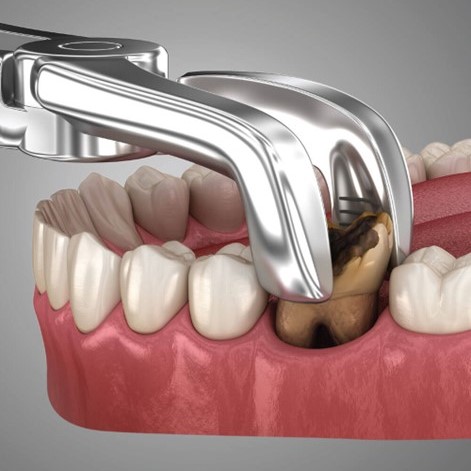Tooth Extraction.
Wisdom Tooth Extraction
Experience a painless procedure with precise accuracy.

Wisdom Tooth Extraction
Wisdom teeth are the final set of molars to emerge, typically between the ages of 17 and 25. They generally do not cause issues if they come in correctly.
However, if there is insufficient space for them to emerge, if they fail to fully erupt through the gums, or if they are impacted or trapped in your jaw, extraction may be necessary.

When Should Wisdom Teeth Be Removed?
Regular checkups allow your dentist to monitor the condition of your wisdom teeth. Here are some reasons why extraction might be recommended:
- Improper Position: Wisdom teeth not in their ideal position can trap food, leading to decay and potential damage to surrounding teeth.
- Difficulty Cleaning: Wisdom teeth that have not erupted fully are challenging to clean and floss effectively.

When Should Wisdom Teeth Be Removed?
- Infection Risk: Partially erupted wisdom teeth can allow bacteria to enter the gums, increasing the risk of infection and gum disease.
- Crowding: Wisdom teeth lacking sufficient space may crowd and harm adjacent teeth.
- Cyst Formation:Wisdom teeth growing within a sac in the jawbone can cause the sac to fill with fluid, forming a cyst that may damage nerves, teeth, and jawbones.

How Do You Know Your Wisdom Teeth Are Growing In?
In addition to noticing new molars at the back of your mouth, there are several symptoms that may suggest your wisdom teeth are emerging:
- Pain and Tenderness: Discomfort or tenderness in the gums where the wisdom teeth are growing.
- Bleeding: Gums may bleed or appear red and swollen.
- Jaw Pain or Swelling:You might experience pain or swelling in your jaw.
- Bad Breath or Unpleasant Taste: Persistent bad breath or an unpleasant taste in your mouth.
- Difficulty Opening Your Mouth: Trouble opening your mouth fully.
These symptoms may indicate issues with your wisdom teeth and warrant a consultation with your dentist.
